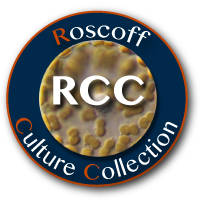| Title | Zobellia roscoffensis sp. nov. and Zobellia nedashkovskayae sp. nov., two flavobacteria from the epiphytic microbiota of the brown alga Ascophyllum nodosum, and emended description of the genus Zobellia |
| Publication Type | Journal Article |
| Year of Publication | 2021 |
| Authors | Barbeyron T, Thiébaud M, Le Duff N, Martin M, Corre E, Tanguy G, Vandenbol M, Thomas F |
| Journal | International Journal of Systematic and Evolutionary Microbiology |
| Volume | 71 |
| ISSN | 1466-5026, 1466-5034 |
| Keywords | RCC6906, RCC6907, RCC6908, RCC6909 |
| Abstract | Four marine bacterial strains were isolated from a thallus of the brown alga Ascophyllum nodosum collected in Roscoff, France. Cells were Gram-s tain-negative, strictly aerobic, non-flagellated, gliding, rod-shaped and grew optimally at 25–30 °C, at pH 7–8 and with 2–4 % NaCl. Phylogenetic analyses of their 16S rRNA gene sequences showed that the bacteria were affiliated to the genus Zobellia (family Flavobacteriaceae, phylum Bacteroidetes). The four strains exhibited 97.8–100 % 16S rRNA gene sequence similarity values among themselves, 97.9–99.1 % to the type strains of Zobellia amurskyensis KMM 3526T and Zobellia laminariae KMM 3676T, and less than 99 % to other species of the genus Zobellia. The DNA G+C content of the four strains ranged from 36.7 to 37.7 mol%. Average nucleotide identity and digital DNA–DNA hybridization calculations between the new strains and other members of the genus Zobellia resulted in values of 76.4–88.9 % and below 38.5 %, respectively. Phenotypic, phylogenetic and genomic analyses showed that the four strains are distinct from species of the genus Zobellia with validly published names. They represent two novel species of the genus Zobellia, for which the names Zobellia roscoffensis sp. nov. and Zobellia nedashkovskayae sp. nov. are proposed with Asnod1-F08T (RCC6906T=KMM 6823T=CIP 111902T) and Asnod2-B07-BT (RCC6908T=KMM 6825T=CIP 111904T), respectively, as the type strains. |
| URL | https://www.microbiologyresearch.org/content/journal/ijsem/10.1099/ijsem.0.004913 |
| DOI | 10.1099/ijsem.0.004913 |






